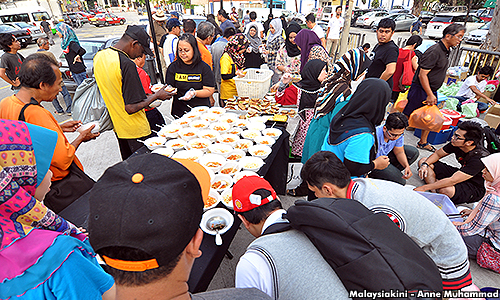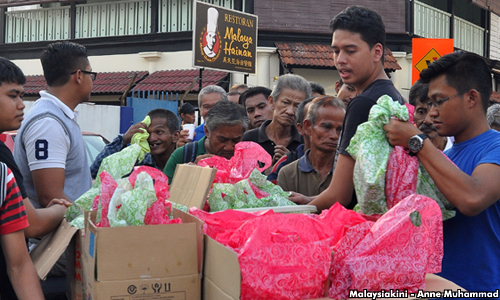
Kuala Lumpur City Hall (DBKL) has issued a directive limiting the locations of soup kitchens to just three areas in the city: Anjung Singgah, Pusat Khidmat Gelandangan and Pusat Transit Gelandangan.
The reason for the restriction on soup kitchens is because of the lack of cleanliness and inconsistent feeding routines practised by the different soup kitchen groups.
According to a 2014 Malaysiakini report, Deputy Federal Territories Minister Loga Bala Mohan said the guidelines would not involve soup kitchens operated from premises such as houses of worship and shoplots.
Speaking to Malaysiakini yesterday, the coordinator for Dapur Jalanan Soup Kitchen, Quratulain Atiqah, 26, said she was aware of the directive.
 “This is probably an initiative of DBKL to keep the streets clean,” she said.
“This is probably an initiative of DBKL to keep the streets clean,” she said.
“However, we at Dapur Jalanan Soup Kitchen use reusable utensils and therefore, we do not see why cleanliness should be an issue on our side,” Quratulain added.
Dapur Jalanan Soup Kitchen serves food to the homeless every Sunday, at Jalan Panggong in Kuala Lumpur.
“We will continue to serve the needy at our regular spot,” she said when asked whether the new directive would affect the service of her soup kitchen.
However, other soup kitchen operators hold different views.
Directive long in coming
Justin Cheah, the project director for Kechara Soup Kitchen Society Malaysia (KSK), told Malaysiakini that the directive was long in coming.
KSK has been operating in the country since 2006 and also provides other assistance to the homeless and needy.
“This has been the longest topic of discussion and I myself have attended several meetings with the DBKL and have been up-to-date on this topic,” Cheah said.
He explained that non-governmental organisations (NGO) such as KSK are designed to work hand-in-hand with the ministry and that this "move forward" would certainly help to refocus the feeding scheme.
Asked how this directive would affect his soup kitchen, Cheah said the only inconvenience would be informing his clients about the shift.
“This limitation to three locations would hopefully give us more time to spend with our clients, because it’s not just about feeding them, rather we like spending time with them,” he added.
The co-founder of "The Nasi Lemak Project", Mastura M Rashid, 27, echoed the same thoughts as that of Cheah.
Mastura agreed with the City Hall directive, saying she has noted that there has been an increase in food wastage.
“My only concern is that the 'street classes' also held for the homeless at different locations, usually accompanied by meals, might be affected if this directive comes into place."
She also said that "The Nasi Lemak Project" would not be affected by this directive as they have stopped feeding the homeless since February 2016, due to overfeeding.
“We aim to empower poor families to sell nasi lemak instead, in the light of their existing poverty,” Mastura said.
Mastura also said her group is now involved in other projects involving education, as well as projects to alleviate poverty in the rural areas.
“Instead of handing out free food, we want to take initiatives to empower the poor, so that they can readily fend for themselves, eventually,” she added.- Mkini



No comments:
Post a Comment
Note: Only a member of this blog may post a comment.